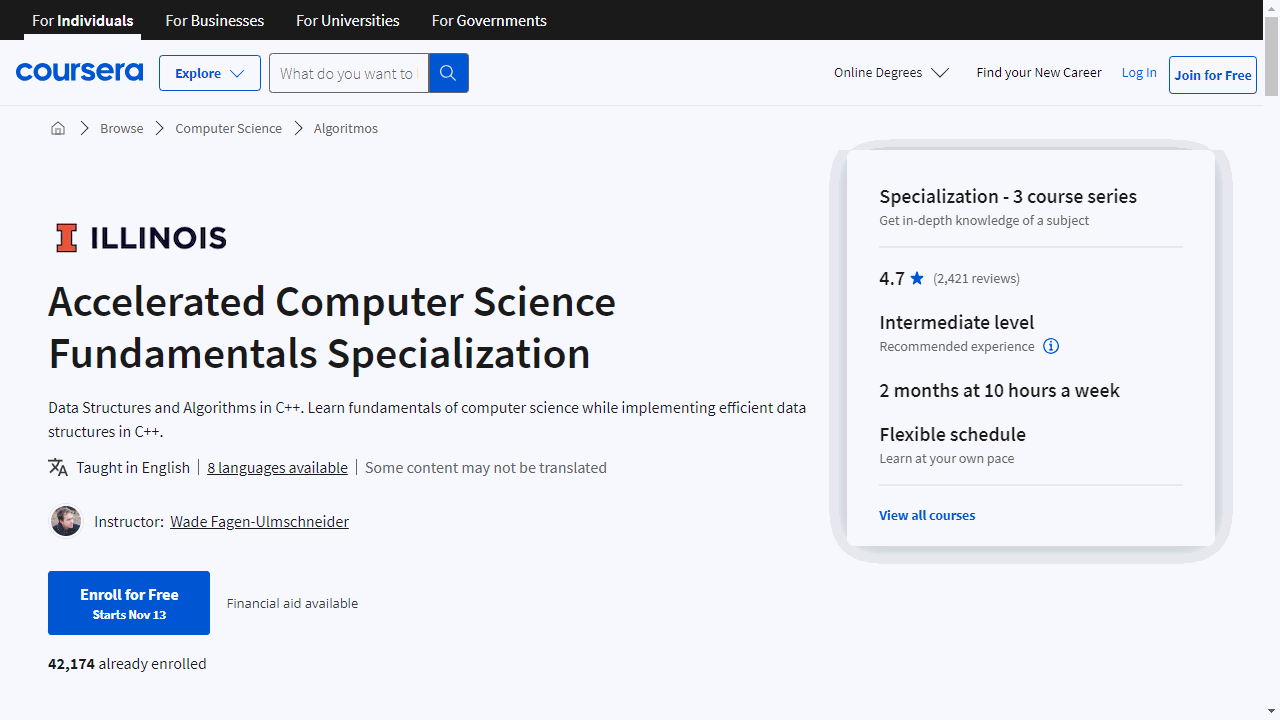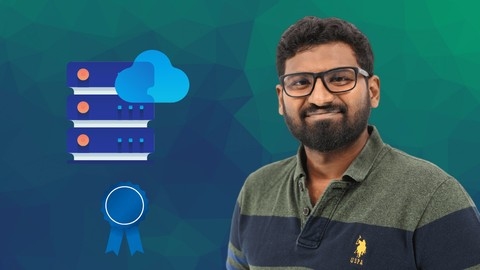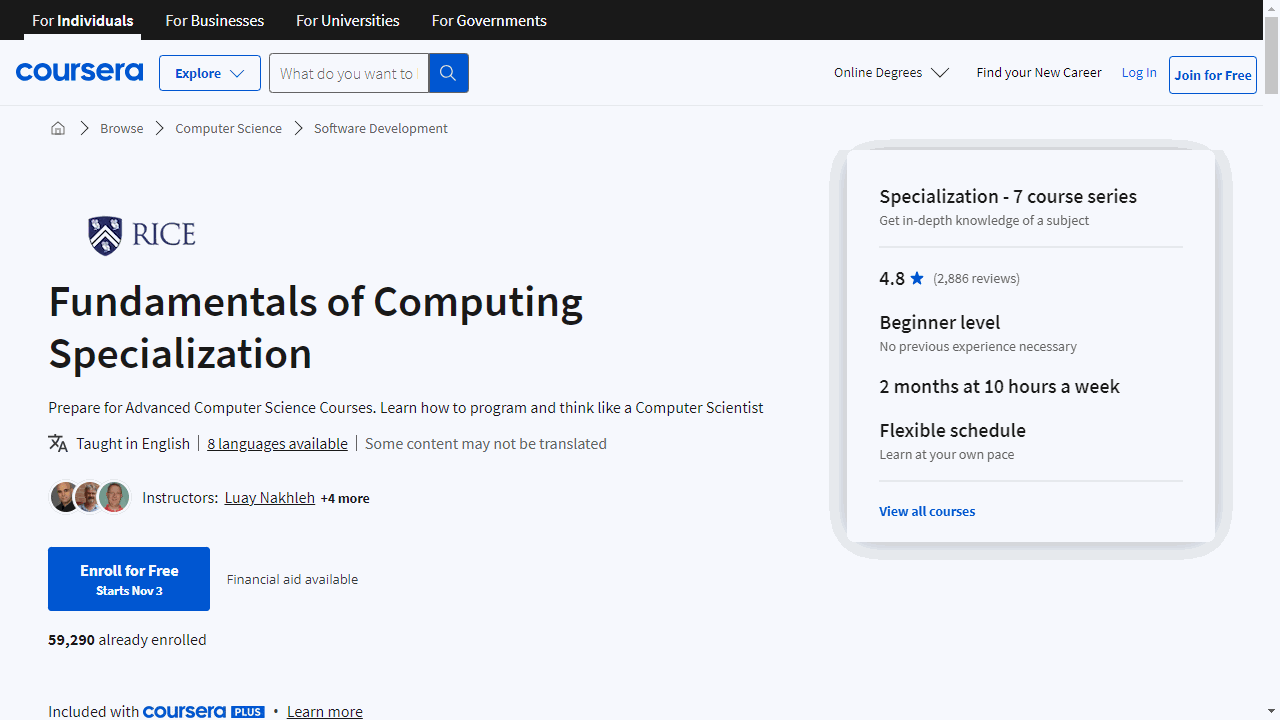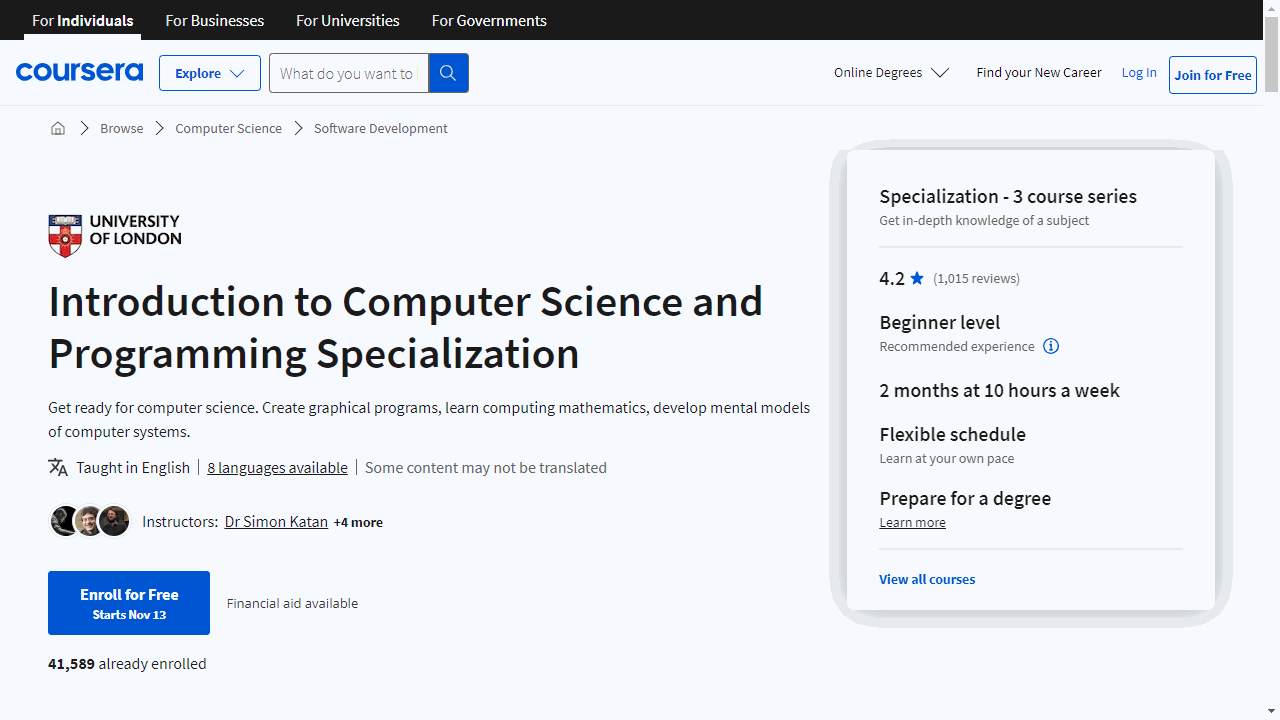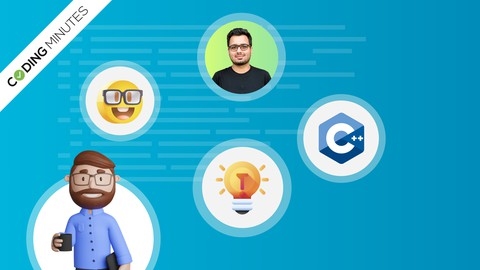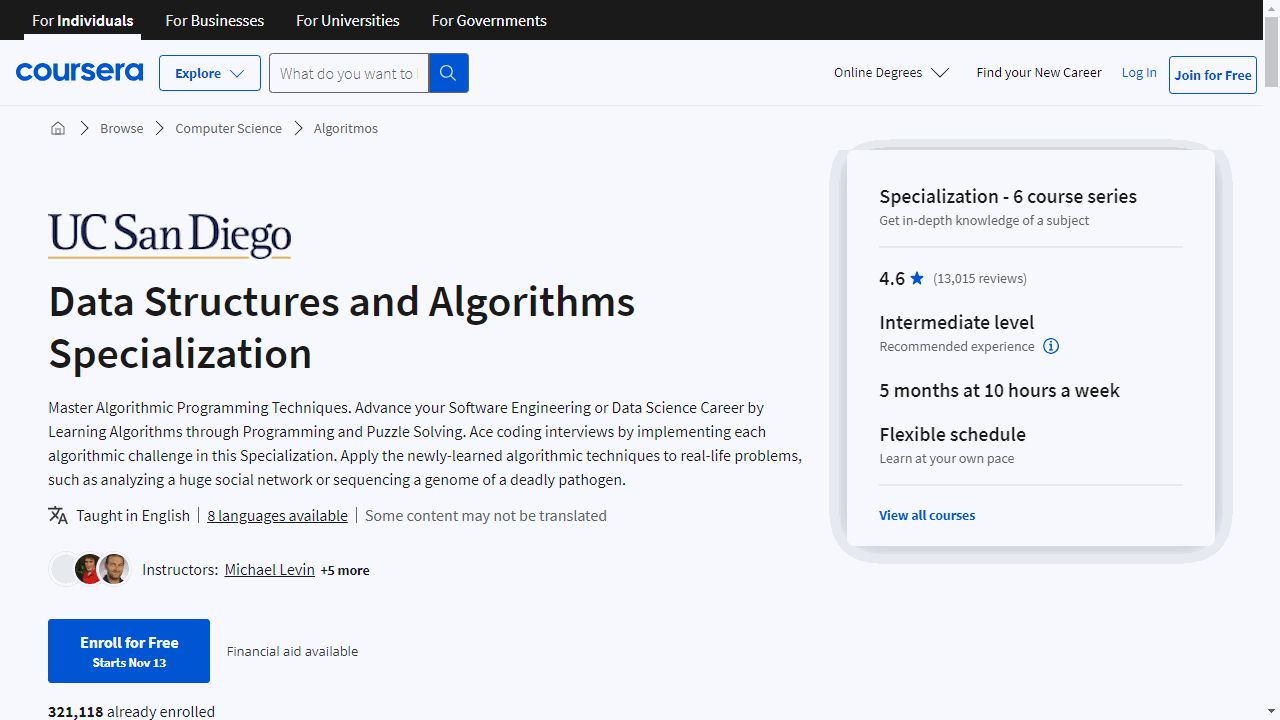Computer science is the foundation of our digital world, encompassing the theory, design, and application of computers and computational systems.
By understanding computer science principles, you gain a deeper understanding of how software and hardware work, enabling you to develop efficient algorithms, design robust data structures, and solve complex problems.
Whether you aspire to be a software engineer, data scientist, or simply a more informed technology user, a strong foundation in computer science is invaluable.
Finding a comprehensive and engaging computer science course can be challenging, especially with the abundance of options available online.
You want a course that not only covers the fundamental concepts but also provides practical experience and prepares you for real-world applications.
Based on our research, we believe Computer Science 101: Master the Theory Behind Programming is the best computer science course overall.
This Udemy course offers a solid theoretical foundation in programming concepts, delving into algorithms, data structures, and essential computer science principles.
It provides hands-on exercises and quizzes to reinforce your learning, making it an excellent choice for beginners and those seeking a strong theoretical understanding.
However, we understand that your learning preferences and goals may vary.
That’s why we’ve compiled a list of other exceptional computer science courses catering to different learning styles and areas of focus.
Continue reading to explore our top recommendations and find the perfect course to embark on your computer science journey.
Computer Science 101: Master the Theory Behind Programming
Provider: Udemy
This Computer Science 101 course on Udemy provides a solid theoretical foundation in the fundamental concepts of programming.
You’ll begin your journey by delving into the binary number system, understanding how computers communicate using binary code and practicing conversions between binary and decimal.
You’ll then explore the world of algorithms, where you’ll learn to analyze their efficiency using n-notation and Big O notation.
This knowledge will enable you to compare different algorithms like Quick Sort, Merge Sort, and Insertion Sort, identifying their strengths and weaknesses based on their performance characteristics.
The course then transitions into the essential topic of data structures, introducing you to arrays, linked lists, stacks, and queues.
You’ll gain a deep understanding of how these structures are used to organize and store data efficiently.
Building upon these foundational data structures, you’ll explore more advanced concepts such as trees, heaps, and graphs, which are crucial for comprehending complex algorithms and data processing techniques.
Furthermore, you’ll learn about hashing algorithms like linear probing, quadratic probing, and rehashing, discovering how they facilitate quick data searching and retrieval.
Throughout this comprehensive course, you’ll have ample opportunities to solidify your understanding through practical code examples.
These hands-on exercises will enable you to apply theoretical concepts to real-world programming scenarios.
Additionally, you’ll test your knowledge through quizzes, reinforcing your learning and ensuring you grasp the core principles of computer science.
Accelerated Computer Science Fundamentals Specialization
Provider: Coursera
This specialization equips you with the fundamentals of computer science.
You’ll begin by mastering C++ programming, learning to set up your coding environment and write efficient code.
Imagine building your programming toolbox, filled with skills to create and manage data structures using C++ classes – this is what the first course provides.
Next, you’ll explore how to organize and access data efficiently using ordered data structures.
This includes learning about arrays, linked lists, and trees – all crucial for creating fast search and sort algorithms.
You’ll also dive into algorithm complexity analysis, which helps you understand an algorithm’s efficiency.
Finally, you’ll unravel the world of unordered data structures, like hash tables, used for quick data access in applications like web caches.
You’ll learn how graphs represent relationships between data points and how to find the shortest path between them.
You’ll also master disjoint sets, a crucial concept for graph algorithms.
Database Management System from scratch - Part 1
Provider: Udemy
In this course, you start with the Entity-Relationship (ER) model, which helps you visualize how data connects.
You’ll learn to represent different parts of a database, like entities, attributes, and relationships.
The course covers various relationships including one-to-one, one-to-many, and many-to-many.
You’ll even tackle more complex scenarios like recursive relationships and weak entities.
You then move on to the Relational Model, which organizes data into tables.
You learn how to convert ER diagrams into these tables, even handling tricky situations like multi-valued attributes.
The course introduces you to super keys, candidate keys, and primary keys, which are crucial for maintaining data integrity.
You’ll also explore constraints, like entity integrity and referential integrity, to ensure data consistency and avoid errors.
This course then dives into Functional Dependencies, a key concept in database design.
You’ll use closure operations to find keys and simplify functional dependency sets.
The course doesn’t just throw concepts at you; it uses practical problems and examples to help you master the skills.
You’ll understand how data is organized and managed effectively, preparing you to design your own databases.
Fundamentals of Computing Specialization
Provider: Coursera
This specialization equips you with fundamental programming and computer science skills using Python.
You begin by constructing interactive applications, including a digital stopwatch and the game “Pong,” mastering elements like expressions, conditionals, and functions.
You then progress to “Principles of Computing,” where you’ll acquire essential programming practices and mathematical problem-solving techniques.
Through weekly Python projects involving strategy-based games, you’ll grasp concepts like probability, combinatorics, and testing.
“Algorithmic Thinking” immerses you in the world of algorithmic efficiency, applying it to real-world scenarios using graph theory.
You’ll implement graph algorithms in Python and analyze real-world datasets.
This course introduces advanced techniques like divide-and-conquer and dynamic programming, empowering you to construct efficient solutions for computational problems.
Finally, you’ll showcase your command of the specialization through a capstone exam, demonstrating your understanding of graph theory, algorithms, and data structures.
This specialization provides a robust foundation in computational thinking, enabling you to write efficient and well-structured programs for real-world problem-solving.
Operating Systems from scratch - Part 1
Provider: Udemy
This Udemy course on Operating Systems takes you on a journey from the ground up, starting with the fundamentals of how computers work.
You’ll uncover the inner workings of hardware components and how they collaborate, discovering why Operating Systems are vital for managing this complex dance.
You’ll then explore the essence of Operating System concepts like process management.
This means understanding the difference between a program and a process, delving into the various states a process can be in, and how multiprogramming allows a computer to juggle multiple tasks seemingly at once.
A core focus of the course is CPU scheduling algorithms.
You’ll learn about popular algorithms like SJF, SRTF, FCFS, LJF, and LRTF.
By comparing their strengths and weaknesses, you’ll understand how they directly impact system performance, a crucial aspect of Operating System design.
The course then tackles memory allocation, another essential function of Operating Systems.
You’ll uncover the differences between contiguous allocation and non-contiguous allocation, explore fixed and variable partitioning, and discover how these techniques affect program execution.
Along the way, you’ll gain insights into binary addressing concepts and learn why paging is a fundamental concept in modern Operating Systems.
Introduction to Computer Science and Programming Specialization
Provider: Coursera
This specialization on Coursera is a fantastic starting point for your computer science journey.
You will begin by grasping the basics of programming using Javascript and the p5.js library.
Picture yourself constructing 2D shapes, manipulating them with your mouse, and even cracking puzzles using lines of code.
Next, you will delve into the fascinating world of how computers function, exploring concepts applicable to any computer system.
This exploration extends beyond mere software usage; you will understand how systems like word processors, e-commerce platforms, and even the internet operate, making you a more informed and effective computer user.
Finally, prepare to be introduced to the mathematical foundations crucial to computer science.
You will explore various number systems, learn to represent space using coordinates, and understand how to analyze variations in quantities through graphs.
You will even acquire the skills to send secret messages and design computer graphics.
This course can be your stepping stone toward a Bachelor’s degree in Computer Science, particularly the one offered by the University of London.
Data Structures & Algorithms Essentials using C++ (2023)
Provider: Udemy
This course guides you through the exciting world of data structures and algorithms using C++.
You start with the basics, learning how to work with arrays and sort data using algorithms like Bubble Sort, Insertion Sort, and Selection Sort.
You will master the art of string manipulation using character arrays, performing actions like string copy, comparison, and concatenation.
As you progress, you will delve into the world of 2D arrays, pointers, and dynamic memory allocation, essential concepts for efficient memory management in C++.
You’ll then conquer vectors, dynamic arrays that simplify data management.
The course demystifies bit manipulation, teaching you how to leverage bitwise operators for tasks like setting specific bits or counting set bits.
You’ll then explore recursion, a powerful problem-solving technique that breaks down problems into smaller, similar ones.
The course covers powerful algorithms like Merge Sort and Quick Sort and explores backtracking to find all possible solutions.
You will learn to analyze algorithm efficiency using Big O notation, understanding how memory usage and execution time scale with input size.
The course then introduces Object-Oriented Programming (OOP) in C++, guiding you in designing modular, reusable code using classes and objects.
You will implement a Shopping Cart system using OOP principles, applying your knowledge to a practical project.
You will become proficient in using Linked Lists, Stacks, and Queues, fundamental data structures with specific functionalities.
The course then dives into Binary Trees, teaching you how to represent, traverse, and manipulate this hierarchical data structure.
You’ll learn how to calculate tree height, find the diameter, and determine if a tree is symmetrical.
Building on this, you will explore Binary Search Trees, a specialized tree optimized for searching.
Finally, you’ll explore advanced topics like Heaps, Hashing, and Tries.
You’ll learn about Hash Tables and techniques for handling collisions and about Tries, specialized trees used for efficient string storage and retrieval.
Data Structures and Algorithms Specialization
Provider: Coursera
This specialization takes you deep into algorithms and data structures, giving you the skills to tackle complex problems head-on.
You’ll begin with the “Algorithmic Toolbox” course, mastering techniques like sorting algorithms (like merge sort and quick sort), searching algorithms (like binary search), divide-and-conquer, greedy algorithms, and dynamic programming.
You’ll understand how these techniques work and how to apply them to real-world problems.
Next, you’ll explore “Data Structures,” learning how to organize data efficiently using structures like arrays, priority queues, hash tables, and binary trees.
This knowledge helps you design better algorithms and choose the right tools for different tasks.
You’ll even discover how services like Dropbox use these structures to manage large file uploads.
“Algorithms on Graphs” introduces you to graphs, a way to represent relationships.
You’ll learn graph traversal algorithms, shortest path algorithms (like those used in Google Maps), and minimum spanning trees.
These skills apply to navigation, network design, and social network analysis.
“Algorithms on Strings” delves into text processing.
You’ll learn how to search for patterns in text using algorithms like tries, suffix trees, and suffix arrays.
These algorithms are crucial for tasks like building search engines and analyzing DNA sequences.
Finally, “Advanced Algorithms and Complexity” challenges you with sophisticated algorithms and the limits of computation.
You’ll learn about network flows, linear programming, NP-completeness (understanding the difficulty of certain problems), and streaming algorithms for processing massive datasets.
Also check our posts on:


